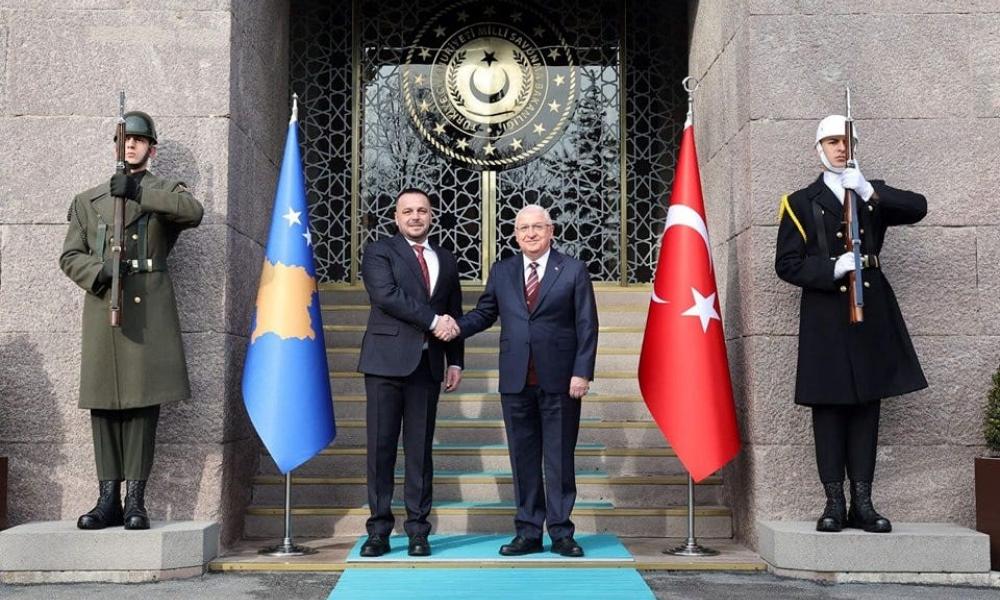The fact that there is an underlying great instability in the Western Balkans with tendencies to create new foci of military confrontations in the region is well known.
The EU-Greece policy towards Turkey in the Balkans
This is why the EU favors the integration of the Balkan countries into its bosom, in an effort to lower the tones and tensions between the many ethnic differences and to bring peace to the region.
Greece, for its part, helps the European integration of these countries with its policy, but not Turkey, which sees the majority of the Balkan countries as its vassals, attempting to revive the Ottoman Empire's dominance in the region according to its standards. past.
Kosovo - Bosnia Herzegovina and Albania are the three (3) Balkan countries, springboards for the Turks.
Turkey-Kosovo Military Agreement signed
"In an important move that reflects the changing geopolitical landscape in the Balkans, Kosovo's Defense Minister Ejup Maqedonci signed a landmark military agreement with the Republic of Turkey during an official visit," reports International Media, which notes:
"This visit comes amid ongoing tensions between Kosovo and Serbia and wider regional uncertainties.
The signing of the Military Framework Agreement with Turkey by Turkish Minister of National Defense Yasar Güler, marks the deepening of military cooperation between the two nations.
This agreement includes various aspects of military cooperation, including the exchange of military personnel, joint training, investment in the defense industry, and medical care for members of the Kosovo Security Force (FSK) in Turkey.
Minister Makedonci emphasized the cultural ties between Kosovo and Turkey, noting that the agreement extends their cooperation in the military field. This move aims to contribute to the maintenance of peace and stability not only in the region but also more broadly. The deal is a strategic step for Kosovo, which is working to modernize and strengthen its defense capabilities amid growing security concerns.
Turkey in the role of mediator for the accession of Kosovo to NATO
This development is particularly important in light of recent escalations in Kosovo-Serbia relations. Serbia, under President Aleksandar Vucic, has stepped up its military posture, recently boasting of its tank arsenal and criticizing US support for Kosovo's defense upgrades, including the supply of Javelin anti-tank missile systems.
Serbia's refusal to recognize Kosovo's independence and its alignment with Russia have further complicated the situation.
Kosovo's decision to sign an agreement with Turkey on military cooperation is a clear indication of its efforts to strengthen its defense capabilities in a region characterized by historical conflicts and ongoing tensions.
The deal with Turkey, a key NATO member, not only bolsters Kosovo's military might but also signals its alignment with Western defense standards, potentially paving the way for closer integration into Euro-Atlantic security structures.
The situation presents a complex challenge for the international community, especially considering the potential risks of escalation in a region that has experienced significant turmoil in the past. The involvement of major powers such as Russia and NATO adds concern to the already complex political and military dynamics in the Balkans.
This agreement between Kosovo and Turkey is a development that highlights the changing power equations in the region and the importance of strategic alliances in maintaining regional stability and security.
Kosovo's defenses beef up against Russian threat and US election uncertainty
Today's military agreement between Kosovo and Turkey, against a background of warnings about the need for Europe to strengthen its defenses against Russian aggression, has significant implications for Kosovo.
The stark assessments by Polish and German experts, combined with concerns about the Kremlin's intentions, underscore the urgent need for smaller nations like Kosovo to strengthen their military capabilities and alliances.
Kosovo's move to deepen military ties with Turkey can be seen as a preemptive step in that direction, especially considering the potential threat posed by Russia under President Vladimir Putin.
Putin's ambitions to restore Russia's imperial greatness and his recent increase in defense spending, including a major budget boost for military spending, are worrying signs for European nations.
This situation is exacerbated by the United States' uncertain commitment to NATO, particularly under a possible future presidency of Donald Trump, who has expressed ambivalence toward the Alliance.
For Kosovo, a country still struggling for widespread international recognition and dealing with ongoing tensions with Serbia, a nation closely aligned with Russia, strengthening its defenses is a matter of national security and geopolitical necessity."
Erdogan's ambitions in the Balkans
Following the above, we would say that the agreement with Turkey represents a crucial step in strengthening Kosovo's defense capabilities and aligning with stronger military forces, at a time when the Russian threat to Europe is growing.
However, knowing full well that all of Erdogan's moves are made solely with Turkish and not Allied interests in mind, we understand that the Turkish President is attempting through the defense agreement with Kosovo to "throw ashes in NATO's eyes" that he is promoting the containment of the Russian threat through Serbia in the Balkans.





